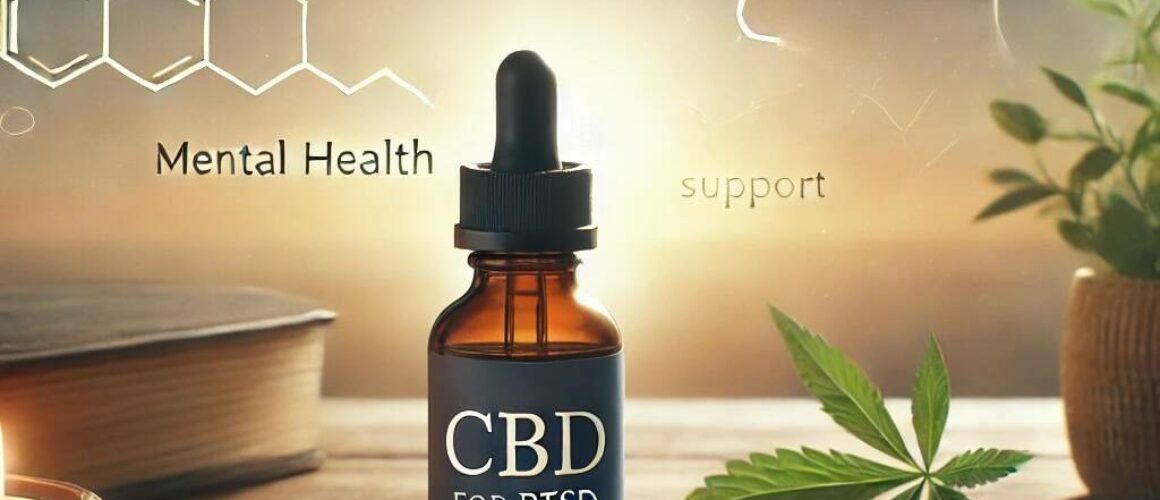Cannabis and Mental Health: Exploring the Potential Benefits of CBD for Depression and PTSD
In recent years, CBD (cannabidiol) has gained significant attention for its potential to aid in the management of various mental health conditions, including depression and post-traumatic stress disorder (PTSD). Unlike THC (tetrahydrocannabinol), the psychoactive component of cannabis, CBD is non-intoxicating and offers therapeutic effects without the “high” associated with THC. This blog will explore the science behind CBD’s potential benefits for mental health, focusing on how it may help alleviate symptoms of depression and PTSD.
Understanding CBD and Its Role in Mental Health
CBD interacts with the body’s endocannabinoid system (ECS), which plays a key role in regulating mood, stress responses, and emotional processing. The ECS helps maintain balance within the body by modulating various physiological processes, including mental health. By interacting with ECS receptors, particularly CB1 and CB2, CBD can influence neurotransmitter activity and potentially provide relief for those suffering from mental health conditions.
CBD for Depression
Depression is a mood disorder that affects millions of people globally, often resulting in persistent feelings of sadness, hopelessness, and fatigue. While traditional treatments such as antidepressants are commonly prescribed, they don’t work for everyone and may come with unwanted side effects. CBD, on the other hand, is being explored as an alternative or complementary therapy for depression due to its interaction with serotonin receptors in the brain.
How It Works
- Research suggests that CBD may influence how the brain’s receptors respond to serotonin, a neurotransmitter linked to mood regulation. A 2014 animal study found that CBD has both antidepressant and anti-anxiety effects due to its impact on serotonin receptors. This indicates that CBD may enhance mood and help alleviate feelings of sadness and hopelessness commonly associated with depression.
- Personal Experiences: Some individuals who have used CBD for depression report improved mood, reduced anxiety, and a general sense of well-being. While personal stories are encouraging, it’s essential to acknowledge that more human studies are needed to fully understand how CBD impacts depression.
CBD for PTSD (Post-Traumatic Stress Disorder)
PTSD is a condition that develops after experiencing or witnessing a traumatic event. Symptoms of PTSD include flashbacks, nightmares, anxiety, and emotional numbness, all of which can severely disrupt daily life. CBD has emerged as a potential treatment for PTSD, particularly for its ability to regulate fear and anxiety responses.
Scientific Evidence
- A 2019 study published in the Journal of Alternative and Complementary Medicine found that CBD helped reduce symptoms of PTSD in patients, particularly with nightmares and intrusive memories. This research suggests that CBD may be effective in managing PTSD symptoms by regulating memory processing and emotional responses.
- Expert Opinions: Dr. Scott Shannon, an expert in integrative medicine and mental health, highlights that CBD’s potential for reducing hyperarousal and calming the nervous system makes it an attractive option for individuals with PTSD. Furthermore, CBD’s calming effects may help patients manage their anxiety, improve sleep quality, and reduce the intensity of traumatic flashbacks.
How to Use CBD for Depression and PTSD
- Dosage and Form: Start with a low dose and gradually increase it until you find the right amount that provides relief. Common forms of CBD include oils, tinctures, capsules, and edibles. Always consult with a healthcare professional before incorporating CBD into your treatment regimen, especially if you are on medication.
- Consistency is Key: Consistent use of CBD is important for maintaining balanced levels in the body. Some individuals may notice improvements in their symptoms after a few days, while others may require several weeks of consistent use.
- Full-Spectrum vs. Isolate: Full-spectrum CBD contains all cannabinoids, terpenes, and flavonoids found in the hemp plant, offering the entourage effect, which may enhance the overall therapeutic benefits. However, CBD isolate contains only CBD and may be preferred for those who wish to avoid THC entirely.
Personal Stories and Testimonials
- David’s Story: A veteran suffering from PTSD, David turned to CBD after struggling with anxiety, flashbacks, and insomnia for years. After introducing CBD oil into his routine, David reported a significant reduction in his anxiety levels, more restful sleep, and fewer PTSD-related nightmares. His experience reflects the growing number of personal accounts where CBD has provided relief for PTSD symptoms.
- Maria’s Journey: Diagnosed with depression in her early 20s, Maria faced years of trying different antidepressants with little success. After trying CBD, Maria experienced a noticeable shift in her mood, feeling calmer and more balanced throughout the day. She emphasizes the importance of consulting a doctor and choosing high-quality CBD products from trusted sources.
Expert Opinions on CBD for Mental Health
Many experts are optimistic about CBD’s potential for treating mental health conditions, though they also call for more comprehensive research. Dr. Yasmin Hurd, a neuroscientist at the Icahn School of Medicine, has been a proponent of using cannabinoids to treat mental health disorders. She notes that while preclinical studies show promise, clinical trials are necessary to determine the full therapeutic potential of CBD.
Conclusion
CBD offers exciting potential as a natural treatment for mental health conditions like depression and PTSD. By interacting with serotonin receptors and regulating emotional responses, CBD may help alleviate symptoms such as anxiety, hopelessness, and traumatic memories. However, while early research and personal stories are encouraging, more clinical studies are needed to fully understand CBD’s long-term impact on mental health. If you or someone you know is considering using CBD to manage mental health conditions, it’s crucial to consult with a healthcare professional to ensure it is safe and appropriate. With ongoing research and growing evidence, CBD may become a key component in the treatment of mental health disorders.

